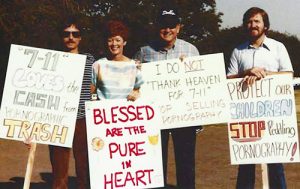There’s a new war on pornography in America, and it’s just as complicated as ever.
As BNG reported a week ago, James Dobson’s Family Policy Alliance has made defeating Satan and porn one of its priorities this year. What’s old is new again — just with better technology.
For decades, Christians in general and evangelicals in particular have been on the frontlines of fighting pornography, although with the rise of men’s movements like Promise Keepers in the 1980s, the strategy shifted to the demand side more than the supply side.
Lately, more evangelical pastors have preached sermons on how to break the porn habit than on calling for boycotts of porn providers. But it hasn’t always been that way.

Vintage photo of a 7-Eleven store (Source: ClickAmericana.com)
From 7-Eleven to 24/7
In the 1980s, Jerry Falwell and Donald Wildmon led a boycott of the Southland Corp. that caused 7-Eleven to no longer shelve Playboy, Penthouse and Forum magazines. In 1986, most soft-core pornography was distributed in glossy print magazines available not only at convenience stores — along with cigarettes and beer — but at book stores at the local mall.
But then, the internet changed everything. Pornography grew the internet. Online porn — in all its searchable variety — made it unprofitable to publish print magazines but highly profitable to be online. Today, pornography is estimated to be a $100 billion global business and a $13 billion business in the U.S.

David Reagan and his wife, Ann, together with two staff members of the National Federation for Decency, Gary Byers (left) and Mike Witte (right) participated in the march against the Southland Corporation in August 1985. (Photo: Lion and Lamb Ministries)
By some accounts, 58% of adults and 78% of adult men take a look at pornography now and then. Numerous reports have highlighted the emotional and spiritual damage that accompanies porn usage, even for adults. That includes not only addiction but also harboring fantasies that are harmful to women in particular.
Access to pornography has been linked to early erectile dysfunction in young men, unrealistic expectations in marriage and even abuse of women. There is a movement called “ethically sourced porn” that seeks to ensure the actors featured in photos and videos are willing participants and are not harmed in the production.
While most of the alarms sounded about pornography in America focus on heterosexual acts, pornography for gay men also is a huge business — by some estimates making up half the porn industry’s income.
A parallel industry has arisen for companies that offer internet monitoring services to prevent access to porn or to hold individuals accountable. And some conservative religious groups have developed books, seminars and online resources to counteract the lure of pornography — especially among Christian men. Helping men “break free” of porn has been a key agenda of groups like Promise Keepers.
Despite all these countervailing forces, the porn industry has continued to grow and to dominate online. That’s perhaps why the latest anti-porn strategy is not about the users but about the providers.

(Shutterstock)
Age-verification laws
The Daily Citizen, news site of Focus on the Family, reports that 10 states have passed age-verification laws that require online companies that produce “substantial” amounts of pornography to create age-verification systems to ensure under-age kids — children and teenagers — cannot access their content.
Florida is the latest state to pass such a law, joining Indiana, Louisiana, Utah, Montana, North Carolina, Virginia, Mississippi, Arkansas and Texas. Similar legislation is pending in other states as well.
They charge this model legislation is intended to shut down their business entirely, not to protect minors.
Purveyors of sexually explicit material and those who access it charge these laws are overly restrictive and are not the best way to keep minors from being exposed to pornography. They charge this model legislation is intended to shut down their business entirely, not to protect minors.
Pornhub — a media conglomerate with multiple brands — is among those leading the charge against the state laws. The company has taken particular aim at Texas, where Attorney General Ken Paxton — a Southern Baptist — seeks to vigorously enforce House Bill 1181, an age-verification law passed last year.
In response, the company has shut down access to its sites in Texas, just as it has in Virginia and some other states with similar laws. Today, Texas visitors to Pornhub are greeted with this message:
As you may know, your elected officials in Texas are requiring us to verify your age before allowing you access to our website.
Not only does this impinge on the rights of adults to access protected speech, it fails strict scrutiny by employing the least effective and yet also most restrictive means of accomplishing Texas’s stated purpose of allegedly protecting minors.
While safety and compliance are at the forefront of our mission, providing identification every time you want to visit an adult platform is not an effective solution for protecting users online, and in fact, will put minors and your privacy at risk. …
The safety of our users is one of our biggest concerns. We believe that the only effective solution for protecting minors and adults alike is to verify users’ age on their device and to either deny or allow access to age-restricted materials and websites based on that verification.
We call on all adult sites to comply with the law. Until the real solution is offered, we have made the difficult decision to completely disable access to our website in Texas. In doing so, we are complying with the law, as we always do, but hope that governments around the world will implement laws that actually protect the safety and security of users.

To the Supreme Court
And as of yesterday, this legal battle is headed to the U.S. Supreme Court.
As reported by The Hill: “A trade group representing the adult film industry is asking the Supreme Court to pause a Texas law that requires adult sites to verify the ages of their users, claiming that it violates the sites’ First Amendment rights. Friday’s filing requests the Supreme Court halt the law’s enforcement while justices consider whether to take on a full appeal of the legislation.”
We’ve seen this movie before.
As The Hill explains: “The Supreme Court has been critical of attempts to limit access to adult materials in the past, including in a 1997 case over internet pornography. Plaintiffs argued in the new filing that the appellate decision goes directly against that precedent and should be paused while the high court considers a full appeal.”
The conversation has been muddied by far-right zealots arguing for book bans that would prevent schoolchildren from learning about human sexuality and gender — making sex education sound like porn.
And the Texas Tribune noted that three decades ago the U.S. Supreme Court ruled in Reno v. American Civil Liberties Union that provisions of the 1996 Communications Decency Act and 1998 Child Online Protection Act — passed with the stated purpose of protecting minors from inappropriate materials — violated the First Amendment’s right to free speech.
The problem courts have wrestled with is how to protect children while allowing adults access to content that is considered free speech.
Politically, everyone agrees children should be protected from sexually explicit material. There is wide bipartisan support for such efforts, even though there is disagreement over how to accomplish the goal.
The conversation has been muddied by far-right zealots arguing for book bans that would prevent schoolchildren from learning about human sexuality and gender — making sex education sound like porn.

(123rf.com)
What is porn?
Depictions of sexual acts are as old as recorded history. How people react to those has varied throughout time, as has the definition of what constitutes inappropriate depictions.
In 1964, Supreme Court Justice Potter Stewart famously said he couldn’t define pornography but “I know it when I see it.”
One person’s “smut” is another person’s “erotica.”

Donald Wildmon, campaigner against immorality on TV, poses with arms crossed on top of a TV in the offices of American Family Association in 1989. (Photo by Will And Deni McIntyre/Getty Images)
For an interesting example of this, see BNG’s most-read story of this week, about an acclaimed circus-style performer who was hired to entertain men attending the Stronger Men’s Conference, a rally for conservative Christian men.
Because the sword-swallower performed shirtless — as many such daredevil actors do — some observers labeled him a “stripper.” That perception was aided by the fact that he also performed with a pole nearby that was likened to a “stripper pole.”
The conference blew up when controversial preacher Mark Driscoll chastised leaders for inviting the sword swallower, whom Driscoll said introduced the “Jezebel spirit” to the conference.
“Jezebel” is a trope for an alluring female seductress — a biblical image widely misused to denigrate women and especially Black women.
If there’s one thing we know for certain about the Christian church in America, it’s that the church has difficulty talking about sex. There is no space for rational discussion, for learning, even for debating.
But the church does know something about free speech, a democratic tenet held in common by both preachers and pornographers.
Christians want to have unfettered access to express their viewpoints and practice their faith. It’s ironic that some critics of the modern-day church see its religious dogma as more damaging than pornography.
Free Speech Coalition, an association of adult entertainment industries and one of Pornhub’s co-plaintiff in the lawsuit against Texas, has an interesting historical take on this point, reported by the Texas Tribune: “Many of the First Amendment protections Americans hold dear are the result of hard battles fought by the adult industry and others over issues such as these. None of these battles has ever been simple or easy, though they have been important and just.”


